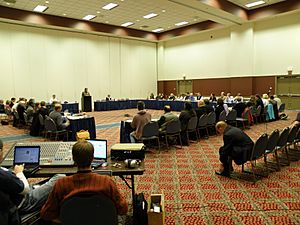Academic senate facts for kids
An academic senate (also called a faculty senate or just senate) is a group of people who help run some universities and colleges. They usually focus on school-related things like what courses are taught or how students are graded. Most members are teachers or professors from the university.
Universities can be run in different ways. Some have one main group in charge (called 'unitary' or 'unicameral'). Others have two main groups (called 'dual' or 'bicameral').
In a 'unitary' system, a board or council often leads, and the academic senate might just give advice. In a 'bicameral' system, both a senate and a board exist. They usually have different jobs: the senate handles academic stuff, and the board handles money and big plans. Sometimes, one group (usually the board) has more power than the other.
Contents
How Universities Are Run Around the World
Universities around the world have different ways of being governed. Let's look at some examples:
Countries with Senate-Led Governance
In a few places, like the Brandenburg region of Germany, the academic senate is the main governing body. This means the teachers and professors have a lot of say in how the university is run.
Countries with Board-Led Governance
In many countries, like Belgium (Flanders), Iceland, Denmark, Sweden, Norway, and Portugal, a board or council is the main governing body. Even if there's an academic senate, it usually only gives advice and doesn't make the final decisions. The Netherlands has a unique system with two boards instead of a board and a senate.
Countries with Mixed Governance (Dual Systems)
Many countries use a mixed system with both a board and an academic senate.
- Asymmetric Dual Governance: In places like the Czech Republic, Croatia, Finland, Hungary, Luxembourg, France, Georgia, Ireland, Poland, Romania, Scotland, and Spain, both a board and a senate exist. The board usually has more power, but the senate still makes important decisions, especially about academic matters.
- Traditional Dual Governance: Countries like Austria, parts of Germany (North Rhine–Westphalia, Hesse), Italy, Serbia, Slovakia, Slovenia, England, Estonia, Latvia, Cyprus, and Lithuania often have this system. Here, the senate is usually in charge of academic things (like teaching and research), while the board handles money and long-term plans. Both groups have important roles.
Differences in Senates
Academic senates can vary in size and how they work.
- Senates in the US tend to be larger and have more smaller groups (sub-committees).
- Australian senates are often smaller (fewer than 30 members) and are sometimes called 'academic boards'.
- In the US and Australia, the head of the senate is usually elected. In England, the vice-chancellor (the university's top leader) often chairs the senate.
- In Australia, many senates are not set up as official governing bodies by law. Instead, they might be a committee of the university's main council. In the US, about half of senates are official bodies, while in England, two-thirds are.
Academic Senates in Canada
In Canada, most public universities use a 'bicameral' system, meaning they have two main governing bodies: the Senate and the Board of Governors.
- The Senate usually looks after the academic side of things, like what courses are offered, teaching policies, and educational plans.
- The Board of Governors helps set the overall direction for the university and makes decisions about money and how the university operates.
Canadian universities are unique because they are created by special laws. They also operate within specific regional rules and protect 'academic freedom' (the freedom for teachers to teach and research without interference). The university president is chosen by the Board of Governors, but the Senate and the university community are also involved in the decision.
Academic Senates in the United Kingdom
In the UK, how a university is run is usually decided by its own founding documents, like a royal charter or special laws. These documents explain if a senate exists and what powers it has. Changes to these rules often need approval from the Privy Council.
Most older universities in the UK (before 1992) follow a 'civic' model with two main bodies: a university council and an academic senate. The council handles money and overall strategy, while the senate focuses on academic matters.
Some senates, like at Durham and Sheffield, are the main academic authority and can award degrees. Other academic groups, like the academic board at UCL, might advise the main council and *recommend* degrees, but the formal power to award them might lie with another body. Some senates, like at Bristol, get their power from the university's council, rather than having it directly from the university's founding documents.
How Senates Developed in the UK
The idea of academic senates in England started in the 1830s. Early universities didn't always involve teachers in their governance. However, problems arose, and it became clear that professors needed a say in academic matters.
For example, at University College London (UCL), a senate was set up in 1832 to give professors more independence. At Durham, a "fundamental statute" in 1835 gave an academic senate and a group of graduates (convocation) the job of running the university's daily academic business.
Over time, senates gained more power. By the 1960s, it became common for senates to be seen as the 'supreme' academic body, meaning they had the final say on academic matters. They also gained the right to be consulted on new rules and staff appointments.
However, in more recent times, especially after 1992, many universities adopted a more corporate style of management. This led to councils and university leaders having more power, and senates sometimes lost some of their influence. Still, the power of senates can vary a lot between different universities.
Academic Senates in Scotland
In Scotland, the senatus academicus is the top academic body at older universities (called ancient universities). It gets its power from special laws called the Universities (Scotland) Acts.
The senatus is in charge of:
- Approving degree programs.
- Awarding degrees to students and honorary degrees to special people.
- Student discipline.
Its members include:
- The Principal (who leads the Senate).
- Vice-principals.
- The university's secretary.
- Leaders of different academic departments (Deans of faculties, Heads of academic departments).
- Professors.
- Directors of academic services (like the library).
- Student representatives.
Academic Senates in the United States
In the United States of America, the academic senate (or faculty senate) is a group of university teachers who help govern the university. It's a common way for teachers to be involved in how their university is run.
The academic senate usually creates academic policy for the university. This policy must follow rules set by the larger university system, accreditation groups, and state and federal laws.
Even though most universities have an academic senate, some people think they mostly have a ceremonial role. However, some studies suggest that academic senates help spread out power within a university, making it less centralized, especially in academic areas.
The academic senate holds regular meetings with a public agenda. They often use Robert's Rules of Order to keep meetings organized. The senate also has different committees that work on specific policy areas.

The university president and the provost (a senior academic leader) might be officers of the academic senate. Other officers are elected by the senate members. Leaders of colleges and departments might also be members.
Any ideas or actions approved by the academic senate usually need final approval from the university president. Depending on the university's rules, a board of trustees or regents might also need to approve the senate's recommendations.
Universities and Academies with Senates
Here are some examples of universities with academic senates and what they are responsible for:
- University of Bath – called "the supreme academic authority of the University."
- University of Bristol – oversees teaching and research.
- Durham University – the "supreme governing body in all academic matters."
- University of Edinburgh – "the University's supreme academic body."
- University of Manchester – "the University's principal academic authority."
- Newcastle University – "the supreme governing and executive body of the University in all academic matters."
- University of St Andrews – "the supreme academic body."
- Stanford University – the main way for teachers to help set policy and make decisions on academic affairs.
- University of Warwick – "supreme academic authority."
Some other senates have different roles:
- University of Cambridge – its senate is made up of graduates and mainly elects the Chancellor. Academic policy is handled by another group.
- University of Dublin (Trinity College Dublin) – approves degrees but is made up of graduates, not academic staff.
- National University of Ireland – the main governing authority, but not an academic body in its makeup.
See Also



